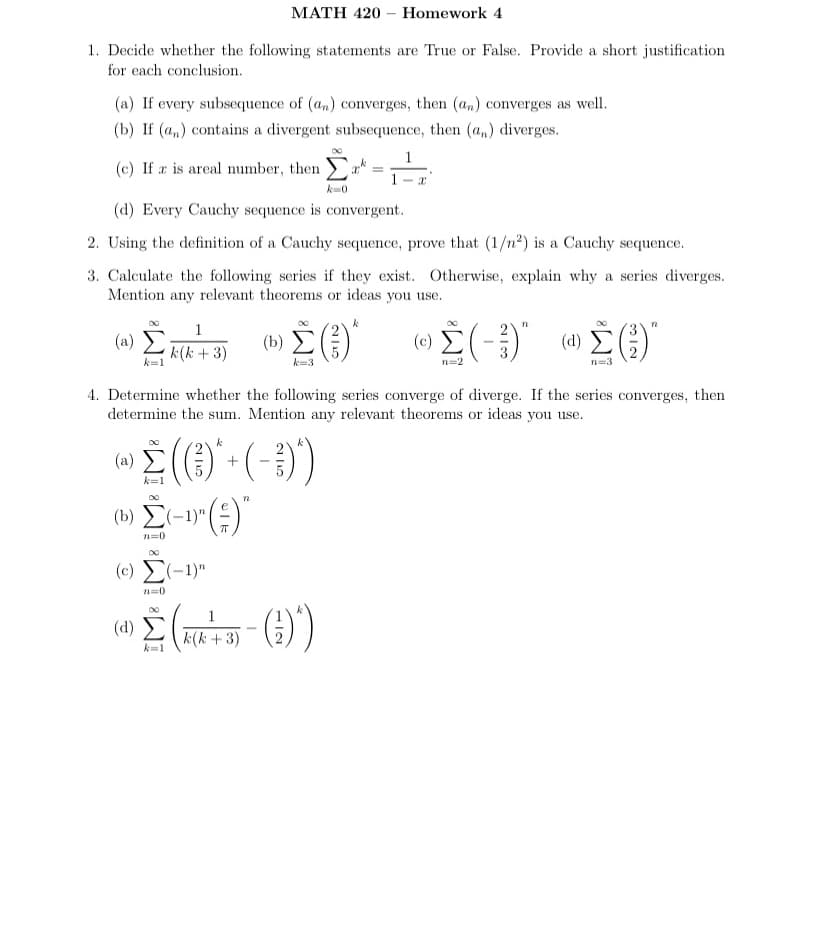1. Decide whether the following statements are True or False. Provide a short justification for each conclusion. (a) If every subsequence of (a,) converges, then (a,) converges as well. (b) If (a,) contains a divergent subsequence, then (a,) diverges. (c) If r is areal number, then (d) Every Cauchy sequence is convergent. 2. Using the definition of a Cauchy sequence, prove that (1/n2) is a Cauchy sequence. 3. Calculate the following series if they exist. Otherwise, explain why a series diverges. Mention any relevant theorems or ideas you use. (e) È(-)" 1 (a) E k(k +3) (4) E) (b) k=1 4. Determine whether the following series converge of diverge. If the series converges, then determine the sum. Mention any relevant theorems or ideas you use. (a) k=1 (b) E(-1)"()" e (c) E(-1)" 1 (d) E k(k +3) WI
1. Decide whether the following statements are True or False. Provide a short justification for each conclusion. (a) If every subsequence of (a,) converges, then (a,) converges as well. (b) If (a,) contains a divergent subsequence, then (a,) diverges. (c) If r is areal number, then (d) Every Cauchy sequence is convergent. 2. Using the definition of a Cauchy sequence, prove that (1/n2) is a Cauchy sequence. 3. Calculate the following series if they exist. Otherwise, explain why a series diverges. Mention any relevant theorems or ideas you use. (e) È(-)" 1 (a) E k(k +3) (4) E) (b) k=1 4. Determine whether the following series converge of diverge. If the series converges, then determine the sum. Mention any relevant theorems or ideas you use. (a) k=1 (b) E(-1)"()" e (c) E(-1)" 1 (d) E k(k +3) WI
Advanced Engineering Mathematics
10th Edition
ISBN:9780470458365
Author:Erwin Kreyszig
Publisher:Erwin Kreyszig
Chapter2: Second-order Linear Odes
Section: Chapter Questions
Problem 1RQ
Related questions
Topic Video
Question

Transcribed Image Text:1. Decide whether the following statements are True or False. Provide a short justification
for each conclusion.
(a) If every subsequence of (a,) converges, then (a,) converges as well.
(b) If (a,) contains a divergent subsequence, then (a,) diverges.
(c) If r is areal number, then
(d) Every Cauchy sequence is convergent.
2. Using the definition of a Cauchy sequence, prove that (1/n2) is a Cauchy sequence.
3. Calculate the following series if they exist. Otherwise, explain why a series diverges.
Mention any relevant theorems or ideas you use.
(e) È(-)"
1
(a) E
k(k +3)
(4) E)
(b)
k=1
4. Determine whether the following series converge of diverge. If the series converges, then
determine the sum. Mention any relevant theorems or ideas you use.
(a)
k=1
(b) E(-1)"()"
e
(c) E(-1)"
1
(d) E
k(k +3)
WI
Expert Solution
This question has been solved!
Explore an expertly crafted, step-by-step solution for a thorough understanding of key concepts.
This is a popular solution!
Trending now
This is a popular solution!
Step by step
Solved in 3 steps with 4 images

Knowledge Booster
Learn more about
Need a deep-dive on the concept behind this application? Look no further. Learn more about this topic, advanced-math and related others by exploring similar questions and additional content below.Recommended textbooks for you

Advanced Engineering Mathematics
Advanced Math
ISBN:
9780470458365
Author:
Erwin Kreyszig
Publisher:
Wiley, John & Sons, Incorporated

Numerical Methods for Engineers
Advanced Math
ISBN:
9780073397924
Author:
Steven C. Chapra Dr., Raymond P. Canale
Publisher:
McGraw-Hill Education

Introductory Mathematics for Engineering Applicat…
Advanced Math
ISBN:
9781118141809
Author:
Nathan Klingbeil
Publisher:
WILEY

Advanced Engineering Mathematics
Advanced Math
ISBN:
9780470458365
Author:
Erwin Kreyszig
Publisher:
Wiley, John & Sons, Incorporated

Numerical Methods for Engineers
Advanced Math
ISBN:
9780073397924
Author:
Steven C. Chapra Dr., Raymond P. Canale
Publisher:
McGraw-Hill Education

Introductory Mathematics for Engineering Applicat…
Advanced Math
ISBN:
9781118141809
Author:
Nathan Klingbeil
Publisher:
WILEY

Mathematics For Machine Technology
Advanced Math
ISBN:
9781337798310
Author:
Peterson, John.
Publisher:
Cengage Learning,

